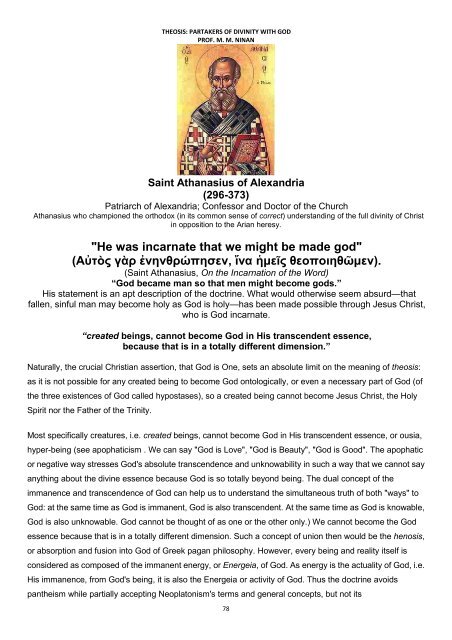Theosis
Create successful ePaper yourself
Turn your PDF publications into a flip-book with our unique Google optimized e-Paper software.
THEOSIS: PARTAKERS OF DIVINITY WITH GOD<br />
PROF. M. M. NINAN<br />
Saint Athanasius of Alexandria<br />
(296-373)<br />
Patriarch of Alexandria; Confessor and Doctor of the Church<br />
Athanasius who championed the orthodox (in its common sense of correct) understanding of the full divinity of Christ<br />
in opposition to the Arian heresy.<br />
"He was incarnate that we might be made god"<br />
(Αὐτὸς γὰρ ἐνηνθρώπησεν, ἵνα ἡμεῖς θεοποιηθῶμεν).<br />
(Saint Athanasius, On the Incarnation of the Word)<br />
“God became man so that men might become gods.”<br />
His statement is an apt description of the doctrine. What would otherwise seem absurd—that<br />
fallen, sinful man may become holy as God is holy—has been made possible through Jesus Christ,<br />
who is God incarnate.<br />
“created beings, cannot become God in His transcendent essence,<br />
because that is in a totally different dimension.”<br />
Naturally, the crucial Christian assertion, that God is One, sets an absolute limit on the meaning of theosis:<br />
as it is not possible for any created being to become God ontologically, or even a necessary part of God (of<br />
the three existences of God called hypostases), so a created being cannot become Jesus Christ, the Holy<br />
Spirit nor the Father of the Trinity.<br />
Most specifically creatures, i.e. created beings, cannot become God in His transcendent essence, or ousia,<br />
hyper-being (see apophaticism . We can say "God is Love", "God is Beauty", "God is Good". The apophatic<br />
or negative way stresses God's absolute transcendence and unknowability in such a way that we cannot say<br />
anything about the divine essence because God is so totally beyond being. The dual concept of the<br />
immanence and transcendence of God can help us to understand the simultaneous truth of both "ways" to<br />
God: at the same time as God is immanent, God is also transcendent. At the same time as God is knowable,<br />
God is also unknowable. God cannot be thought of as one or the other only.) We cannot become the God<br />
essence because that is in a totally different dimension. Such a concept of union then would be the henosis,<br />
or absorption and fusion into God of Greek pagan philosophy. However, every being and reality itself is<br />
considered as composed of the immanent energy, or Energeia, of God. As energy is the actuality of God, i.e.<br />
His immanence, from God's being, it is also the Energeia or activity of God. Thus the doctrine avoids<br />
pantheism while partially accepting Neoplatonism's terms and general concepts, but not its<br />
78

















